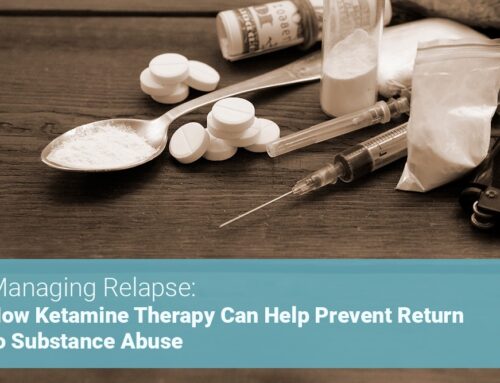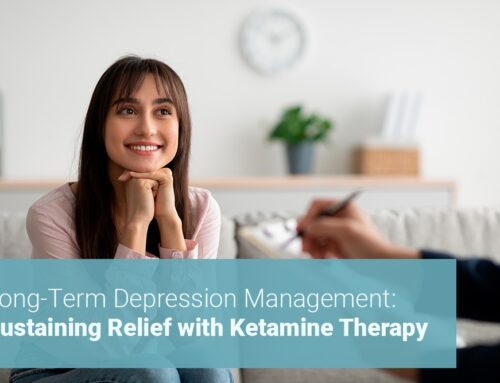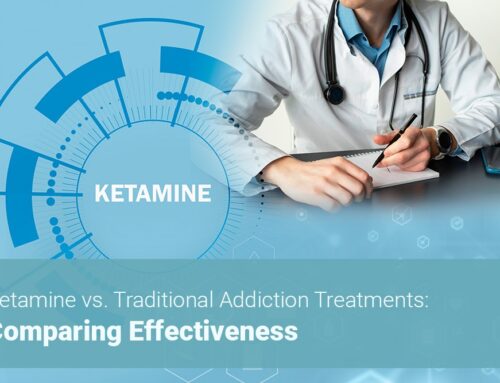If you have a loved one planning for PTSD treatment in Las Vegas with ketamine infusion therapy, there is much that you can do to help support them in having as positive an experience as possible.
How Ketamine Treatment Can Help With PTSD
One of the most valuable ways you can help support your loved one through ketamine treatment is to learn the basics about ketamine therapy and how it can help with PTSD. That way, you have an idea of what to expect, and you don’t have to rely on your loved one to educate you about the treatment when they should be focusing on their own preparations and recovery.
With that in mind, here are some key points about ketamine for PTSD:
- Around 12 million people in the U.S. experience PTSD.
- PTSD can cause severe anxiety, irritability, insomnia, nightmares, and sleep disturbances and negatively impact a person’s quality of life.
- Ketamine infusion therapy targets a particular part of the brain that releases a messenger chemical called glutamate.
- When glutamate receptors become overstimulated, feelings of anxiety can result.
- Ketamine blocks these receptors, which causes a significant release of glutamate and activates AMPA receptors.
- The release of glutamate can reduce feelings of anxiety, while the activation of the AMPA receptors can reduce feelings of depression.
While much of this information relates to anxiety and depression specifically, the data has encouraged researchers to investigate the use of ketamine as a form of treatment for other mental health disorders as well, including PTSD.
Research Supporting Ketamine to Treat PTSD

Research is showing that ketamine therapy can make for an effective PTSD treatment.
According to several researchers, PTSD symptoms may be the result of a “loss of synaptic connectivity.” The stress that people with PTSD experience could cause such a loss. Glutamate is the predominant mediator of this synaptic activity. These researchers, therefore, believe that, by activating the release of glutamate, ketamine could increase synaptic activity, thereby relieving stress associated with PTSD.
Other research has focused on the ways ketamine could be used to prevent such stress disorders rather than being used as a PTSD treatment once symptoms have already arisen.
How to Support Someone Receiving Ketamine Infusion Therapy for PTSD
The American Society of Ketamine Physicians, Psychotherapists, and Practitioners (ASKP3) notes that “Ketamine treatment can be emotionally and physically taxing for the patient, and they need supportive care from loved ones.” Fortunately, as a loved one of a person going through ketamine treatment for PTSD, there are many ways you can provide such support.
Maintain an Open Mind
There is a social stigma about ketamine, in large part relating to its use as a horse tranquilizer and hallucinogenic party drug. Your loved one may already have concerns of their own about taking on this stigma by pursuing ketamine treatment. What they need from you is an open mind about ketamine therapy so they don’t feel judged or question their judgment in pursuing it. If you have skepticism or disbelief about PTSD treatment with ketamine, reserve it for yourself (unless asked.) Remember how much power you have to discourage your loved one from seeing the treatment through; so wield the power responsibly and lovingly.
Your loved one may need this from you, particularly once PTSD treatment with ketamine has already begun, as it can be common for people to reconsider seeing the full course of treatment following the initial session. For ketamine treatment to work effectively, however, a person must complete the full course of treatment. Your open mind and understanding can help you see your loved one through this trying period.
Understand the Program

Your loved one and their physician or clinician will probably have a treatment plan set up before treatment begins. By knowing what this plan is, you can show your loved one the appropriate care and respect while they prepare for treatment, as well as during and after it. By staying aware, present, and flexible regarding your loved one’s treatment, you can do your part to help your loved one have a successful treatment.
It can also be helpful for you to know the route to and from the clinic where your loved one is receiving ketamine treatment and their home. That helps assure your loved one that they will make their treatment sessions on time without stress or anxiety.
On Conversing With Your Loved One About Ketamine Treatment
Before, during, and after the sessions, your loved one may or may not want to talk with you about them. It is natural for you to be curious about PTSD treatment in Las Vegas with ketamine, but if your loved one doesn’t want to talk about it, leave it be. Avoid taking personally your loved one’s responses to you, or lack thereof. If they are feeling quiet or emotional, accept that as well.
Remember that your loved one is receiving ketamine treatment for post-traumatic stress disorder, which means that painful memories, emotions, or experiences may come up for them in the process that they don’t want to discuss. In addition, avoid triggering anxiety or stress in your loved one by avoiding raising potentially traumatic or controversial subjects like politics, money, work, or family.
While the Session Is Taking Place

If your loved one wishes for you to sit with them during the treatment, here are some ways you can help support your loved one in having a positive experience during the session:
- Shut your cell phone off, or keep it in silent mode.
- Don’t make loud noises.
- Avoid making too much movement.
- Keep quiet and avoid initiating conversation with your loved one.
Be aware that your loved one might react unusually during the session, such as with confusion, surprise, or excitement; they may be either talkative or silent. Stay sensitive to their feelings, expressions, and needs as they arise. They may wish for you to hold their hand or not to touch them at all. Understand that your loved one may share their feelings during the session or ask questions about their identity, location, and the reality of what’s taking place. Remember that ketamine is a dissociative substance. Be prepared for these possible responses, so you don’t react with confusion, surprise, or judgment.
If you have any questions about what you are witnessing or what your loved one is experiencing, ask one of the medical staff privately so you don’t cause your loved one any concern.
After the Sessions
Make sure you know in advance of the sessions what your loved one’s desires are for after the session, as they may not be able to understand or express them at that time. Know ahead of time whether your loved one wants to be taken home right away to get some rest or prefers to be out with friends and loved ones.
Support your loved one as well in avoiding making any big decisions that day.
By following these simple guidelines, you can support your loved one in their recovery from PTSD using ketamine infusion therapy.








